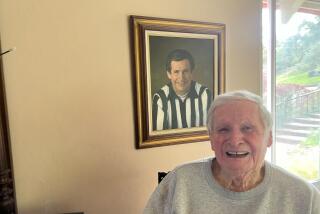Rozelle May Have Made the Right Call After All
- Share via
In shutting down this country’s most popular league Thursday--a decision leading to the closing of virtually every other sport--NFL Commissioner Paul Tagliabue listened to many people.
He listened to his frightened players. In the wake of Tuesday’s terrorist attacks, many were openly fearful of flights and big crowds.
He listened to their imposing union officials. If this weekend’s games were played, some players would not have shown up, and the league would be faced with a new labor tangle.
But as much as anything, Tagliabue listened to a voice from the grave. Former commissioner Pete Rozelle, considered perhaps the best sports executive in history, openly regretted his decision to force the NFL to play on Nov. 24. 1963--two days after the assassination of President John Kennedy.
“Obviously, it was a mistake,” Rozelle said often before his death in 1996.
In this case, however, history will show that perhaps Tagliabue was not listening close enough.
While Rozelle’s decision was criticized by some officials and media, it was based on unimpeachable advice, and resulted in a stunning show of fan support.
While Rozelle called it a misstep, history will show that the decision might have been one of the NFL’s first, tiny steps toward becoming this country’s new national pastime.
“It always surprised me that Pete would tell people he regretted his decision,” said Tex Schramm, former Rozelle confidant and longtime NFL executive. “It was not the wrong decision. The only reason he said that is because he was criticized by some people. But if you look closely, it was not the wrong decision.”
From the time of Tuesday’s national tragedy, Tagliabue took three days to decide to postpone this weekend’s games.
From the time of Kennedy’s death on the Friday afternoon of Nov. 22, Rozelle had about three minutes.
One team, the Baltimore Colts, traveling to Los Angeles to play the Rams, was already in the air. Other teams were waiting for direction.
“Our teams were calling, they wanted to know what to do,” Rozelle recalled in a later interview.
As usual, the quiet Rozelle did the outlandish--summoning Pierre Salinger, Kennedy’s press secretary, via radio from a plane crossing the Pacific.
“Salinger is coming back from the Orient and Pete gets him,” Schramm recalled. “I’ll never forget that.”
Salinger’s advice to Rozelle was simple.
“He told him, ‘Jack Kennedy would have wanted you to play,”’ Schramm recalled. “That was all Pete needed to hear.”
According to Bob Oates, longtime Times football writer, Rozelle also remembered Franklin D. Roosevelt’s directive that the country continue playing baseball during World War II for the good of the nation’s spirits.
“That stuck with him,” Oates said.
By Saturday morning, the day after Kennedy’s death, virtually every professional league had canceled its games, including the rival American Football League.
There would be no NBA, no horse racing, no golf. While some colleges played football--the entire Southeastern Conference, of course--there would be no USC-UCLA football game.
There would also be no games on television, as the networks decided to discontinue all sports broadcasts during the weekend.
Rozelle was the lone dissenter.
He announced that the NFL would play, saying, “It has been traditional in sports for athletes to perform in times of great tragedy.”
Criticism was quick and intense.
Several team and city officials openly complained. The mayor of Philadelphia formally protested, and the Eagles president said he wouldn’t go to the game.
Fans lit up switchboards by the “hundreds,” according to newspaper reports. This newspaper received “two dozen” critical calls.
When the early games began Sunday, things got worse. Jack Ruby had just shot Lee Harvey Oswald and the nation was on the verge of a new panic.
“The continuous television has deepened the sense of tragedy we feel,” Rozelle said.
Yet, amazingly, the games worked. The football succeeded. The message was sent.
Four of the seven games were sellouts, an incredible number in a league that was not yet that popular.
“A crowd ... exceeding all expectations,” wrote this newspaper.
Yankee Stadium was filled with 62,992 for the St. Louis Cardinals and New York Giants.
Philadelphia’s Franklin Field was filled with 60,671, even though the Eagles and Redskins were a combined 4-15-1.
The fans came to the games, it seemed, not so much to watch football, but to grieve and escape and bond.
The crowd at the Coliseum was 48,555 and described like this:
“(They) stood silently, their heads bowed, during solemn pregame ceremonies. But once the whistle blew they cheered and booed and reacted like any typical sports gathering in the U.S.A.”
Fans here told columnist Sid Ziff that they came seeking relief from the sadness on TV. Players said that once the whistle blew, their depression was also lifted.
“I cannot feel that playing the game was disrespectful, nor can I feel that I have made a mistake,” Rozelle said at the time.
But in later years, as new generations couldn’t believe somebody would play football two days after a president’s death, the criticism mounted.
“Pretty soon, Pete just accepted it as fact, that it was a mistake,” Schramm said. “It was not a popular decision. But I always felt it was good for the country, it helped us get up and moving again.”
On the contrary, 38 years later, Tagliabue could not have made a more popular decision. And who can argue, what with still so many missing bodies and unanswered questions?
“It was certainly very easy for him to call the games off,” Schramm said.
Given his historical regret, Pete Rozelle would not have done it any different.
Or would he?
*
Bill Plaschke can be reached at bill.plaschke@latimes.com.
More to Read
Go beyond the scoreboard
Get the latest on L.A.'s teams in the daily Sports Report newsletter.
You may occasionally receive promotional content from the Los Angeles Times.











